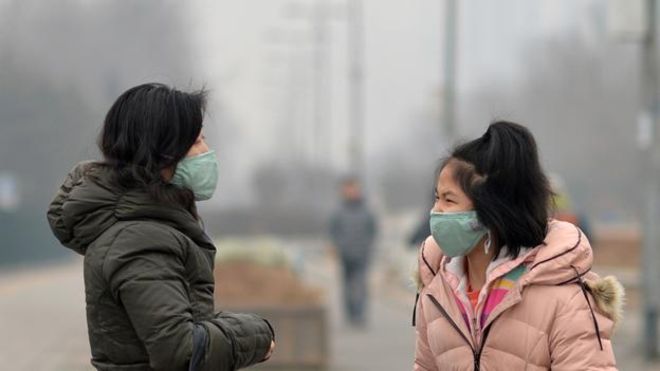“末日空气”再临北京:外籍人士逃离雾霾 - BBC维吉妮·曼金(2023年6月13日)

雾霾笼罩的北京,居民戴着口罩(图片来源:STR/AFP/Getty Images)
北京工作和生活了5年之后,就职于北京哈罗国际学校(Harrow School)的哈拿·桑德斯(Hannah Sanders)和本(Ben)夫妇将在7月份收拾行李返回英国定居。
“我们原本计划在北京住6年。但是这里的污染导致改变计划”,34岁的桑德斯说。她有两个孩子,其中一个还是新生儿。“我觉得我们两岁的孩子在外面玩不安全。污染限制了我们的家庭生活。”
尽管没有官方统计数字,或者中国政府官员不愿意公开统计数字,但是来自企业、学校、大使馆和人力资源咨询公司的消息来源都证实:中国对跨国企业的收入确实越来越重要,但是北京正在迅速失去其对外国雇员的吸引力。
美国商会(American Chamber of Commerce)在3月初发表了“中国商务环境”调查年度报告。其中一个调查问题是“你或者你的组织是否因空气质量问题而在中国招聘或留住高级管理人才方面遇到了困难?” 美国商会365个成员的回答呈现出一种趋势,2014年表示肯定的占48%。与此形成对比的是,2013年为34%,2008年为19%。
虽然几乎不存在公开发布的数据,但是很多行业出现了企业各级别经理试图逃离污染的环境。他们正在向公司申请转至其他地方工作。去年7月,大批外籍家庭告别北京。生活在北京的外籍父母在网上论坛上发表评论显示,逃离北京的趋势从6月就开始出现了。
于是,招聘人士称,外国企业在中国吸引高端人才感到越来越难,很多人拒绝来北京工作的原因就是空气质量越来越恶化。
专注亚洲招聘业务的猎头公司MRCI总经理安吉·伊根(Angie Eagan)说,“北京作为外籍专业人士希望被调派的城市,其分数每年都在下滑。”
根据MRCI最近发表的一项调查显示,北京作为职场人士希望被调派的城市自2012年至今分数下降了3分。在5000人以上的受访者中,56%将健康问题列为工作变动的主要原因之一。不过,汇丰银行最近的一项调查显示,中国凭借其较高的薪酬仍然是外籍人士最希望被调派的国家。
在北京的好几所国际学校的校长私下向BBC商务频道透露,去年入学率下降了5%,而两个主要国家的大使馆分别透露,他们在招聘工作人员时遇到了困难。
家长担忧孩子们暴露在危险的空气污染中将带来长期影响,而本月初一段时间空气污染的减轻对这种担忧完全没有产生缓解作用。3月,监控PM2.5颗粒的污染指数连续数天超过500,比世界卫生组织的建议的健康标准高出20倍,让人们回想到去年华北地区数周被所谓“末日空气”的棕灰色雾霾所笼罩。
世界卫生组织去年发布的一项关于全世界死亡原因的调查发现,2010年,室外空气污染是中国120万人过早死亡的重要原因,这一数字占全世界总数40%。调查公布后,中国大学的多名教授对调查方法提出质疑,称实际数字可能会更高。
不过,中国政府并没有采取消极态度。面对互联网论坛和社交媒体上网民纷纷表达的愤怒情绪,总理李克强多次宣誓“向污染宣战”。中国主要城市都建立了监测系统。虽然数千家工厂被关停,政府投资千万美元用于老旧产业的升级,但是中国主要城市大部分仍然笼罩在灰色的天空下,大多数减排目标都没有达到。
曾经被丰厚的补贴和薪酬吸引到北京工作的外籍家庭对正在加重的污染感到不安。不过,直到18个月前,当外籍人士意识到空气污染问题在短时间内无法解决时,企业才真正开始感觉到形势已经对他们的雇员产生了影响。
中国欧盟商会秘书长亚当·邓尼特(Adam Dunnett)表示,“人们对污染仍在持续感到震惊,他们意识到这不是一个暂时性问题。”
“去年夏天,我度完假回到北京就想,‘我到底是在这里干什么呢?’”2003年来到中国首都居住的艾莉森·汤姆森女士(Alison Thompson)回忆道。她有两个孩子,她曾在北京做幼儿园老师,现在转到日本东京工作。她的丈夫是一家国际石油和天然气公司的咨询顾问,他也申请调职。由于空气质量问题,公司还没有找到接替他的人。
“如今,很难找到一个愿意到北京工作的经理。这真是一项挑战。” 安吉·伊根说。她说,企业的资深人员更多的希望去香港或新加坡工作,这是亚洲颇受欢迎的工作地点。
不过,北京仍然是世界第二大经济体的政治经济中心,很多外企投巨资在这里成立公司,管理它们在中国和亚洲的业务。
其中一些公司已采取重大措施,有的提供更高的补贴,有的提供灵活的工作条件,比如每周支付往返机票,让高级管理人员与住在亚洲其他国家的家人团聚。
很多外企在办公室安装了高技术的空气过滤系统,并为雇员的家中安装空气净化器。公司还规定给雇员发口罩,并开展宣传活动让雇员了解污染对健康造成的危害。
“企业已竭尽全力,但现实是人们还在离开这里……而要吸引人们来这里工作,变得越来越困难。”亚当·邓尼特说。
(责编:友义)
TReturn of ‘airpocalypse’: Beijing’s expats flee smog - By Virginie Mangin
After five years in Beijing, Hannah Sanders and her husband Ben, both employed at Harrow School International in the Chinese capital, will be packing their bags in July and heading back to the UK.
“We had originally planned on staying six years. But pollution tipped the balance” said the 34 year-old mother of two children including a newborn baby. “I don’t feel it’s safe for our two-year-old to play outside. The pollution limits what we can do as a family.” While no official statistics exist, or Chinese government officials are unwilling to share them, sources including companies, schools, embassies and HR consulting firms all confirm the same thing: though China is increasingly important for the bottom line of international firms, Beijing is rapidly losing its charm for foreign employees. The American Chamber of Commerce published the results of its annual ‘China Business Climate’ survey earlier in March. One question asked ‘Have you or your organisation experienced any difficulties in recruiting or retaining senior executives to work in China because of air quality issues?’ Responses from the organisation’s 365 members underline a trend, 48% replied yes in 2014 versus 34% in 2013 and 19% in 2008. Although there is little published data, companies in many sectors report managers at all levels trying to escape the pollution. They're asking to be relocated. Last July saw an increasing number of expat families wave goodbye. Comments on online forums for Beijing parents suggest the exodus started in June. As a result, recruiters say foreign enterprises are having increasing difficulty attracting top talent to The Middle Kingdom as many refuse to move, citing Beijing’s worsening air quality. “Beijing has been dropping a couple of points every year as a city professionals are looking to relocate to”, said Angie Eagan, Managing director for MRCI, a recruitment firm specialised in hiring professionals in Asia. Beijing has lost 3 points since 2012 as the preferred city to relocate to and 56% of the 5000 + people interviewed named health issues as one of the main reasons they would consider changing jobs, according to a recent survey published by the consulting company. Although a recent HSBC bank survey still ranked China as its number one location for expats, flagging high salaries. Off the record, several international schools’ headmasters told BBC Capital that admissions fell by as much as 5% last year and separately two major embassies also said they are having trouble filling staff roles. Parents worry about the long-term effects of exposing their children to hazardous levels of foul air, and the recent bout of pollution registered earlier this month will do nothing to reassure them. The pollution index monitoring PM2.5 particulates rose to over 500 for several consecutive days in March, more than 20 times the level recommended by the World Health Organisation, and a reminiscence of what has been dubbed as the “airpocalypse” of last year when a cloud of brownish grey dust blanketed the north of China for weeks. A WHO survey released last year that looked at causes of deaths worldwide found outdoor air pollution contributed to 1.2 million premature deaths in China in 2010, accounting for almost 40% of the global total. When the survey was published several Chinese university professors contested the methodology and said the figure could likely be even higher. The Chinese government has not remained inactive however. Following a wave of indignation on internet forums and social media, the new Premier, Li Keqiang, has repeatedly vowed to “fight a war on pollution” and a monitoring system has been launched in all of China’s primary cities. But despite thousands of factories forced to shut down and millions of dollars invested to upgrade China’s rundown industrial system, the skies remain grey above much of the country’s main cities and most emission-reduction targets have been missed. Rising pollution has been a concern for the expatriate families drawn to Beijing by plump compensation packages and job opportunities. However it’s only in the last 18 months that companies have really seen an effect on headcount as families come to terms with the realisation there is no quick fix to cleaning the air. “People are surprised the pollution is continuing and have come to realise it’s not a momentary issue”, said Adam Dunnett, Secretary General of the European Chamber of Commerce in China. “I got back to Beijing after our Summer holiday last year and thought, ‘what am I doing here?’” recalls Alison Thompson who had moved to the Chinese capital in 2003. The mother of two and former kindergarten teacher in Beijing has relocated to Tokyo, Japan, where her husband, consultant for an international oil and gas firm asked to be moved. Given the air quality, has not replaced him in Beijing. “It’s hard to find a manager for Beijing today. It’s become a real challenge”, said Angie Eagan, adding senior staff are more often looking to Hong Kong or Singapore as their preferred destinations in Asia. Nonetheless, Beijing remains the political and economic center of the world’s second-largest economy and many foreign companies have invested millions of dollars to incorporate their China and Asia operations there. Some of these companies have taken radical measures. Some offer higher compensation or flexible packages such as paying weekly plane tickets for their executives to see their families settled elsewhere in Asia. Many are installing sophisticated air filtering systems in the work place and offering to pay for air filters for their employees’ homes. Compulsory masks are offered, as well as information campaigns on health risks of pollution. “Companies are doing what they can, but the reality is that people are leaving … And it’s becoming difficult to attract people”, said Adam Dunnett.